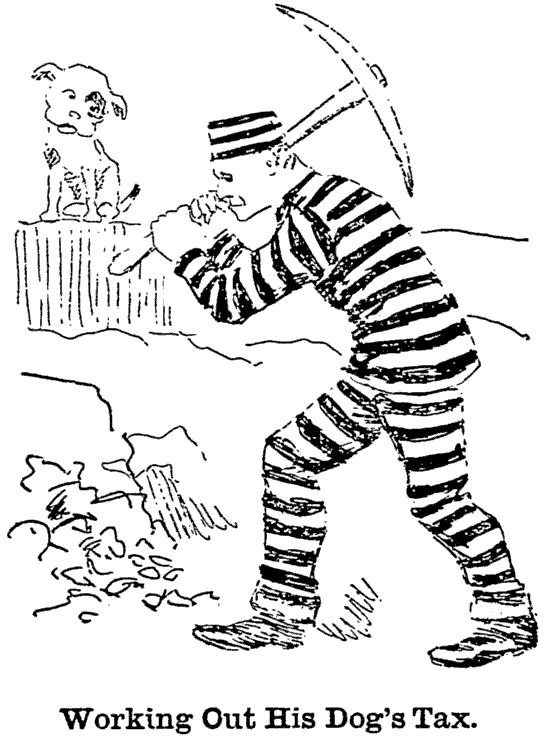
Martyr For His Dog.
William Worden Working Out His Canine’s License in Jail.
William Worden of Greenwich owns a dog of the feminine gender. William is of the opinion that if a dog stays close at home and bothers no one a license should not be collected for harboring such a dog. The selectmen of Greenwich think in another direction and William was served, along with about 200 other Greenwich citizens who own dogs, with warrants to pay their dog tax. While the majority of the 200 held opinions close in relationship to those of William, they were not sufficiently firm in their opinions to refuse to pay up and work out the fine and tax in jail.
But William Worden is a man of his word and he believes in acting as his conscience dictates. It appears that William’s conscience dictated that he ought to refuse to pay the dog tax and he obeyed his conscience (naughty conscience) and the result was that the learned judge down in Greenwich, which is filled with millionaires and other bric-a-brac of the human species, fined William $7 and costs for not pay the tax of his dog of feminine gender.
William refused to pay the $7 and costs and Friday night he came up to Bridgeport to spend a vacation at the jail with Sheriff Hawley. William was handed an adult sized pick and given a guide to show him the way to the stone quarry where he began to work out his dog tax.
William’s dog ought to appreciate her master’s martyrdom but the chances are that when William goes home and the canine of feminine gender sets up a wail of joy at his return and rushes out the gate to meet him he will hand her a kick in the short ribs that will set all the dogs in Grenewich [sic] to yelping anthems of sympathy for the abused canine.
Some folks get really upset when you try to bring a tax between them and their canine companion. Here’s another example, from the New York Times:
Will Not Pay a Dog Tax.
The question as to whether a law requiring the payment of a tax on dogs in Brooklyn is constitutionally proper has never been decided in a court. The Corporation Counsel, however, now has an excellent opportunity of testing the question which is so interesting to so many persons. William H. Vanderbilt, a coal merchant who lives in the new Twenty-ninth Ward, was notified by the City Clerk to take out a license for his dog. Mr. Vanderbilt called at the Mayor’s office , acknowledged that he had a dog, and said he did not propose to pay any license for it. The city, he declared, could go ahead and sue just as soon as it was ready. He characterized the tax on dogs as a legalized steal.
Here’s another example, from the Times :
Refuse to Pay Dog Taxes.
Citizens of Elizabethport Will Test the Legality of a City Ordinance
Elizabeth, N.J., . — The Citizens and Taxpayers’ Association of Elizabethport is resolved to test the legality of the dog ordinance passed last year by the Elizabeth City Council.
The ordinance imposes a tax of $1 on every male and $5 on every female dog, and 50 cents of each payment is to go to the Police Mutual Aid Fund. The association claims that the ordinance is illegal because the Court of Chancery has decided that no moneys raised by taxation can be appropriated to a private purpose. It is claimed that the Police Mutual Aid Society is a private organization.
The members of the association having refused to pay any dog tax, warrants were issued by Justice Hetfield summoning them to appear at the Police Court on Saturday. The dog ordinance imposes a fine of $20 on persons refusing to comply with its provisions.
The police fund received over $1,100 from the dog taxes.
In more than one case, a dog tax imposed by colonial occupiers led to an armed rebellion. Here’s a dispatch from the Dog Tax War:
Tawhiao Levying a Dog Tax.
Prospect of Trouble with the Government.
Tauranga, This Day []. Some trouble is brewing here with reference to dog tax amongst the natives. The Tauranga Maoris are under Tawhaio’s mana, and his representative, Te Mete Raukawa, a well-educated half-caste of high standing, tells the natives that all dogs must be registered with him, he having receipt books, and he will have collars ready on , the fee being below the European one. Should any dog belonging to natives worry sheep or do any other damage, the case must be tried before Te Mete, who will assess the damages. He says the matter was thoroughly threshed out by the Maori Parliament, and under the Treaty of Waitangi the natives are allowed to deal with all matters affecting themselves. The local natives agree to adhere to Tawhiao, and refuse to pay dog tax to the County Council, determining to go to gaol first.
